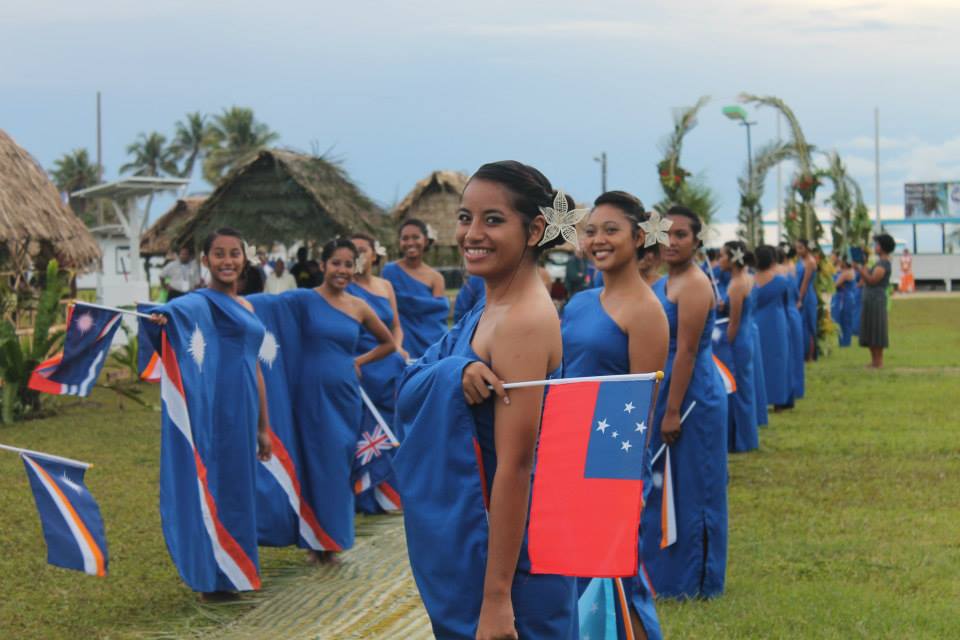
AUCKLAND (Pacific Scoop / Pacific Media Watch): Australia has elected a new leader, Fiji has passed a new constitution and Pacific countries have signed a new declaration on climate change at the end of a ground-breaking week in Pacific politics.
Tony Abbott led the Liberal-National Coalition to electoral victory on Saturday, to become Prime Minister-elect of Australia and one of the most powerful players in the Asia-Pacific region.
He was due to clarify an arrangement for asylum seeker resettlement in Papua New Guinea in the near future, and incoming Australian Foreign Minister Julie Bishop told ABC that developing a “strong mutually respectful relationship with Indonesia" would also be a top priority..jpg)
Abbott’s winning manifesto included an opposition to mining taxes, a tough stance on asylum seekers, scepticism about climate change science and an interest in stronger ties with the Fiji government.
The day before the election, Fiji President Ratu Epeli Nailatikau gave assent to the country’s new constitution, laying the groundwork for the first elections since Prime Minister Voreqe Bainimarama took power in a third military coup in 2006.
Constitution reactions
The constitution and plans for an election this time next year have been cautiously welcomed by the Australian and New Zealand governments.
They supported a motion at the Pacific Islands Forum to consider readmitting Fiji into the fold after “free and fair elections”.
Human rights campaigners and anti-government leaders have been less optimistic about the constitution, and have harshly criticised the arrest of 14 activists on the day of the constitution’s assent.
Amnesty International New Zealand director Grant Bayldon said the arrests were “simply another sign of the crackdown on freedom of expression and public debate” on a constitution that “weakens human rights protections in the country”.
On the same day, in the now-overshadowed end to the Pacific Islands Forum, the United States put its support behind the Majuro Declaration, in which all 15 forum member states agreed to reduce greenhouse gas emissions and respond to the consequences of climate change.
Majuro wins international support
The Majuro Declaration’s widespread support was the main achievement of the four-day summit in the Marshall Islands, in which the running theme was “marshalling the Pacific response to climate change”.
While US Secretary of State John Kerry was pulled away from the summit to attend to a potential military strike against Syria, US Interior Secretary Sally Jewell lead a US delegation to the Forum on Friday.
Jewell pledged more than $30 million towards climate change responses and projects in vulnerable coastal communities, and provided moral support for the declaration.
“Climate change is the defining challenge of our time,” she told the Forum on Friday.
“It’s going to have wide-ranging impacts on every corner of our globe and that’s something that we are already seeing, particularly here as I flew into the airport and saw the sandbags from the last time the water inundated the runway.”
The European Union also indicated financial and moral support for the declaration, despite tough economic times on the continent.
Climate commissioner Connie Hedegaard wrote in a commentary on Thursday that “climate change is happening, it is happening faster than scientists predicted and it exacerbates a whole range of other global problems, of which the Pacific region will bear the full brunt”.
Welcomed declaration
France, Indonesia, South Korea, Thailand and Malaysia recognised the importance of the declaration.
British Minister of State Hugo Swire said the declaration was “very much welcome” and meeting on an atoll less than three metres above sea level “[brought] home pretty quickly” the consequences that climate change posed to the low-lying countries.
New Zealand Prime Minister John Key said his country was already doing its “fair share” to reduce climate change.
“Climate change is a concern for Pacific countries and New Zealand is firmly committed to helping its closest neighbours adapt to and mitigate its impacts,” he said.
Key claimed $80 million had already been committed to renewable energy and climate-related support across the region over the next three years.
That included cyclone shelters in the northern Cook Islands, rainwater harvesting programmes in Kiribati, Tokelau and Tuvalu, and solar power projects in Tokelau and Tonga.
Climate leadership
On paper, the Majuro Declaration recognises climate change as a real and serious threat to the future of many Pacific Islands.
Its 17 clauses recognise the responsibility of all signatories to urgently reduce greenhouse gas pollution and call for all fifteen member states to be “climate leaders”.
In reality, Oxfam New Zealand director Barry Coates said, the declaration was largely aspirational.
“Our commitments on climate change have been weakened,” he said.
“It is shameful that the New Zealand Prime Minister and other developed nations would go to this Forum meeting being held on an island group that has been battered by extreme weather and profess to be acting in solidarity, while refusing to take on their responsibilities for preventing even worse disasters in future.”
Cook Islands Prime Minister Henry Puma, who is also outgoing forum chair, opened the forum last Tuesday, talking up marine conservation parks, renewable energy and the sustainable management of Pacific fishing resources.
He told delegates a “regional blue print” was starting to emerge that involved more effective cooperation, economic advancement and sustainable development.
Pacific Plan Review
In one of the most highly-anticipated events of the forum week, former Papua New Guinea Prime Minister, Sir Mekere Morauta, outlined the preliminary findings of the Pacific Plan Review.
Full findings of the review will be released next month, and are expected to stress the need for greater consultation with local communities.
The legacy of US nuclear testing in the Marshall Islands was not lost on the delegates during the week.
Testing after World War II destroyed an atoll and left the Marshalls with the highest rate of nuclear radiation in the world.
The testing has been linked to health problems generations later, and member states agreed to support the Marshalls with their ongoing grievance against the US government.
Trade negotiations
Leaders also agreed to pursue the Pacific Agreement on Closer Economic Relations (PACER Plus) and European Union trade negotiations, and support a Solomon Islands government review of the Regional Assistance Mission to the Solomon Islands (RAMSI).
On questions of gender equity, the Forum addressed the need to increase the number of women in parliament and the number of girls in classrooms, while legislating against domestic violence and pay inequity.
Forum members made a range of other commitments to develop infrastructure and sustainable energy, regulate the fishing industry, restrict the spread of invasive species and protect marine reserves.
They also agreed to prevent corruption, co-operate on law enforcement, foster regional healthcare and education partnerships, and promote sports as a way of preventing diabetes.
The Pacific Islands Forum will return to Palau next year, as it tries to shed is reputation of being a predominantly South Pacific summit.
This work is licensed under a Creative Commons Attribution-NonCommercial 3.0 New Zealand Licence.




